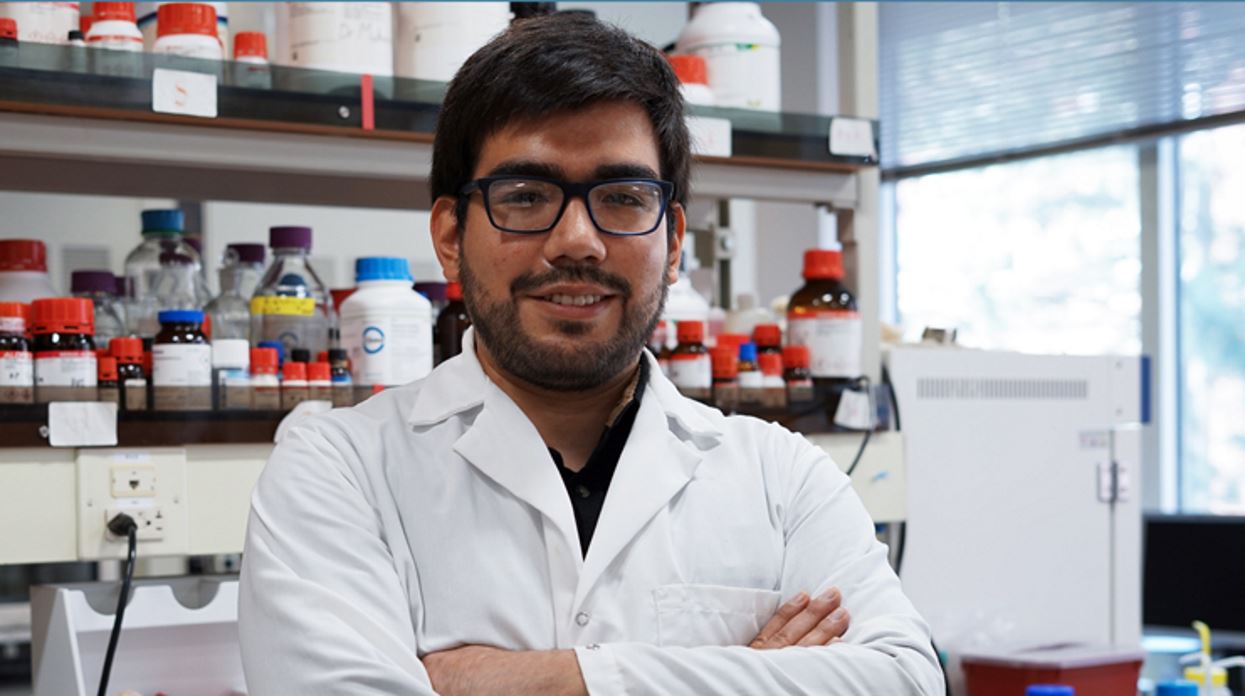
Drug Hunter is Motivated to Help Patients

Jose Mauricio Paredes Quiroz, MS ’22, works in industry to discover and develop a new type of medicine.
Jose Mauricio Paredes Quiroz, MS ’22, discovered his calling in high school. He loved learning about molecules, and he was drawn to the idea of helping humanity. So he set out to become a drug hunter.
Paredes recently achieved his goal, landing a dream job as a medicinal chemist at Dicerna Pharmaceuticals in Lexington, MA. He now works in one of the most exciting areas of drug discovery and development: RNA-based therapeutics. Massachusetts College of Pharmacy and Health Sciences (MCPHS) prepared him for the challenge of working on a new type of medicine.
Paredes first learned about MCPHS as an undergraduate in Peru. The Catholic University of Santa Maria, where he was studying chemistry, has a long-standing collaboration with MCPHS to offer a pharmacology internship in Boston. He completed the internship and later returned to MCPHS for a Master of Science in Medicinal Chemistry degree.
The nuances of molecules fascinate Paredes. His favorite class at MCPHS was Drug Metabolism.
“In the class, you see how small changes in chemistry have effects on the pharmacology of the drug,” he explained. “You need to know chemistry, but you also need to know a little bit of biology to understand what is happening in the body.”
Paredes completed his master’s degree in two and a half years, the only student in his cohort to do so. He completely immersed himself in the MCPHS experience and even met his fiancé at the University.
Paredes opted to pursue a research project on Alzheimer’s disease with his mentor, Associate Dean of Graduate Studies and Professor of Medicinal Chemistry Ronny Priefer, PhD. In patients with Alzheimer’s disease, abnormal clumps of protein pieces form plaques in the brain. Dr. Priefer studies these plaques. One goal of the research community is to disrupt the plaques. Paredes worked toward this objective with libraries of compounds inspired by natural products, which are molecules produced by living organisms.
He was conducting experiments with the compounds in a lab on campus when COVID-19 hit. He switched gears, pivoting to a computer-based project. Instead of testing compounds in plates and Petri dishes, he used computer models to put them through their paces. And he found some promising starting points for medicines.
“On his own, he learned how to model everything,” Dr. Priefer said. “I give him full credit because he took the initiative, and he worked at it, and he had some good outcomes.”
After graduation, Paredes quickly found the Resource Associate job at Dicerna Pharmaceuticals. He is now training compounds called small interfering RNAs to disrupt disease. Specifically, he is tweaking potential medicines to improve them.
“I feel ready for this job,” Paredes said. “I’m directly applying what I learned from 90 percent of the courses that I took at MCPHS.”
More University News
MCPHS 2025: A Year in Photos
Our photos from 2025 show connection, community, and celebration.
MCPHS Strengthens Its Position as a Life Sciences Workforce Leader
A new collaboration with MBI, supported by the Massachusetts Life Sciences Center, will expand access to skills-based QA/QC training.
‘Purpose and Passion’: MCPHS Manchester Students Showcase Research
From pharmacy deserts to Gen Z learning strategies, student researchers explored timely issues shaping the future of healthcare.
Celebrating National Women’s Pharmacist Day: Meet the MCPHS Trailblazers Who Shaped a Profession
Agnes Wilbur, Rosamond Guinn, and Henrietta DeBenedictis used their MCPHS education to pave the way for future generations of female pharmacists.

